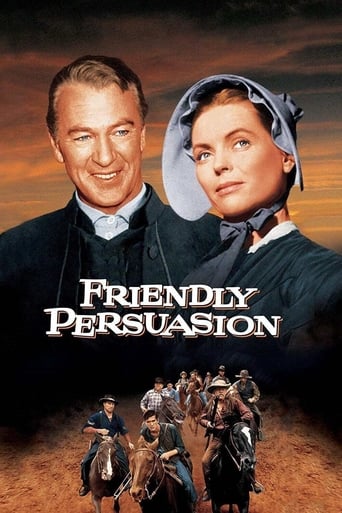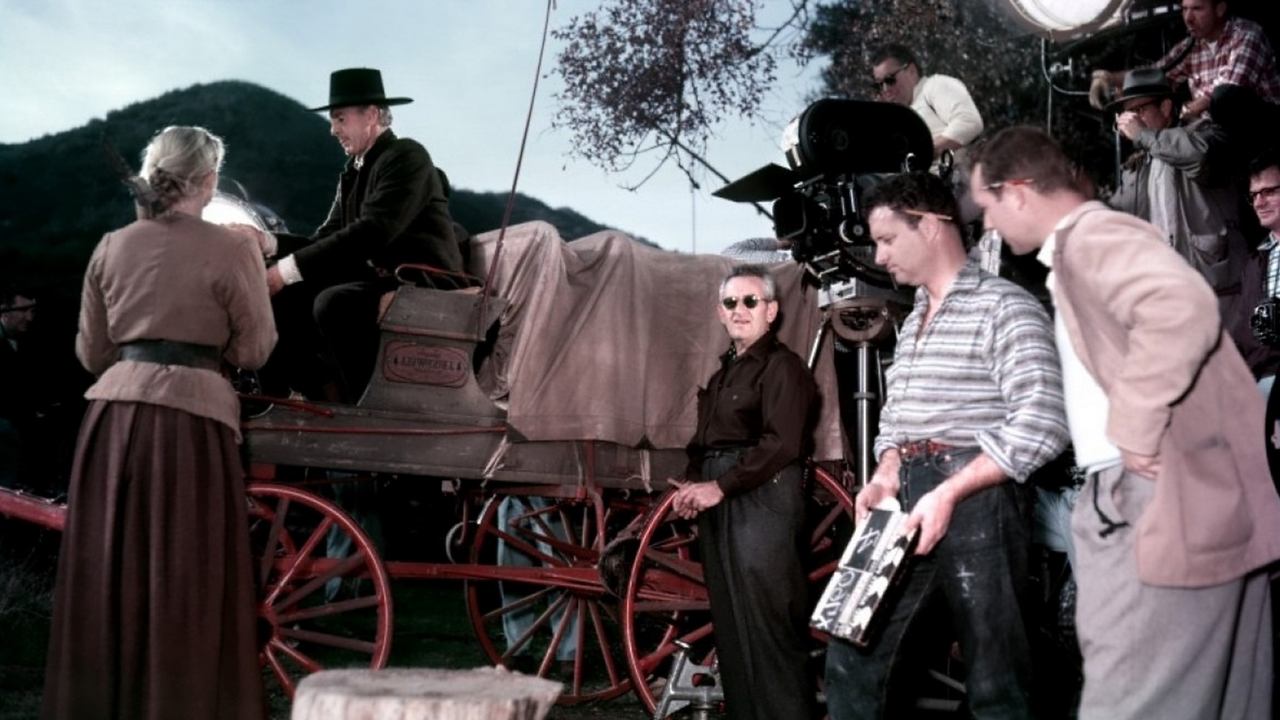Cass Moret
"Friendly Persuasion" was released in 1956, a long time ago. But the movie is a timeless gem and I had the good fortune to watch it recently. Like the lives of real rural Quakers in the 1860s, the lives of the Birdwell's in the movie don't tell a conventional story with a beginning, middle and end. Instead, the movie links together a series of mostly humorous episodes, each of which could be the basis of a self-contained short story: The Birdwell's, father, mother, eligible daughter, teenage son and younger son attend a fair with unexpected consequences. Unknown to his wife, Jess buys a small organ. Its delivery ignites a dispute. Jess and his teenage son, Josh, make a two- week trip selling orchard stock to farmers. They stop at the home of a widow with three "man hungry" daughters who shower Josh with unwanted attention. The Civil War is remote until a plundering rebel patrol suddenly appears at their doorstep. Josh anguishes over killing. All of the actors and actresses turn in fine performances, but Gary Cooper shines. His expressive face can speak volumes without a single spoken word.
gavin6942
The pacifist attitude of a Quaker family is tested as a result of the American Civil War.The worst thing about this movie: the strange rear-projection during buggy scenes, although I will let it slide as a strange relic of the time. Best thing about the movie: Dorothy McGuire was cast as Cooper's wife after Wyler's choice, Katharine Hepburn, declined. Not only was McGuire very good, but it kept that useless hack Hepburn out of a good film.What I appreciate most is the story of the film's production. Writer Michael Wilson told HUAC in 1951, "I feel that this committee might take the credit, or part of it at least, for the fact that 'The Friendly Persuasion' was not produced, in view of the fact that it dealt warmly, in my opinion, with a peace-loving people." Although it took a couple years, a slight name change, and Wilson's name removed, the film did still come out.There were some other changes: "What happened to Wilson's pacifist script after Capra dropped it," notes film historian Joseph McBride, "reflected the political climate of the Cold War. When William Wyler directed the film for Allied Artists in 1956 as Friendly Persuasion, he had the story changed to make the Quaker youth (played by Anthony Perkins) become a killer. The Quakers in Wyler's version, as Pauline Kael observed, 'are there only to violate their convictions.' But some of the strength of Wilson's conception remains, as in a scene of a crippled Union Army officer respectfully challenging the steadfast Quakers about pacifism in their meeting house." I would like to have seen the stronger argument for pacifism...The film also received mild criticism for certain inaccurate portrayals of Quaker views, such as a misunderstanding that although Quakers disliked programmed music they did value individual original expressions of it; and in meetings, Bible passages are not read verbatim but speakers recite scripture from memory and express its meaning in their own words. Here is another thing I would have liked to see, a stronger and more accurate portrayal of Quakers. But the point was to pick a religious group that was anti-war, not necessarily be strict in the representation. So we must not be too harsh.
earlytalkie
This film is simply one of the great classics of cinema. Who would have thought that Allied Artists, spun off from tiny Monogram, could produce a film of such magnificence and beauty. Gary Cooper and especially Dorothy McGuire create beautiful characterizations as the Birdwells. Anthony Perkins, in one of his first roles, is swell as the young Quaker torn between his beliefs and his conscience. Marjorie Main and her three spinster daughters will have you howling with laughter. Even Samantha the goose is more than competent in her part. The photography, in color by DeLuxe, is simply gorgeous and the music by Dimitri Tiomkin is lovely. Here is a picture where sex obviously takes place, and yet it is not thrown in your face with explicit scenes. This is a beautiful, gentle film which bears repeat viewings. On the DVD there is an interesting extract from the NBC TV series "Wide, Wide World" which digs into the behind the scenes particulars of this filming. An enriching experience.
moonspinner55
A labor of love for director William Wyler, based upon the stories of Jessamyn West regarding the Birdwells, a peacemaking Quaker family in 1862 Indiana who are faced with changing times when Civil War unrest breaks out. Will the Birdwell men fight for their freedom or "hide" behind the sanctity of the church? Gary Cooper plays the family patriarch with a rascally touch; he coasts through the role--never letting us forget he's acting the good sport--though his boyish charm sparks the proceedings and attains the good will of the audience. The children bristle under the strict guidance of their by-the-Good-Book mother (a retread performance from Dorothy McGuire), with eldest son Anthony Perkins questioning the family's refusal to become involved in potentially violent matters. There's also a bad-tempered goose, and a freckle-faced child who opens the movie with a voice-over narration (which is then, thankfully, abandoned). Certainly the most prestigious picture up to this time to be released from second-string Allied Artists, though the plastic coating over the project mitigates against enthusiasm. ** from ****



 AD
AD



